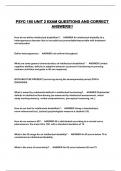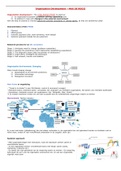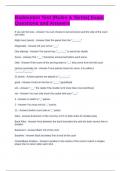A set of laws and guidelines that establishes the distribution of power within a political system,
relationships between political institutions, the limits of government jurisdiction, the rights of
citizens and the method of amending the constitution itself.
Constitutions are seen as ‘founding’ documents as they often come from a moment of
history of a country e.g. after independence (USA 1789), after a revolution (France 1791) or
when a new state is formed (South Sudan, 2011).
The UK constitution is made up of written documents and a host of unwritten elements and
a number of sources make up the UK constitution.
The Magna Carta (1215) is referred to as a constitutional document. It states the principle
that no-one should be denied their property and liberty – and at the time it was a
concession King John gave to his nobles.
It introduced the notion of Habeas Corpus (you shall not have the body), which established
that nobody should be incarcerated without charge, and it gave the right to trial. It is an
international symbol of liberty that inspired the American Declaration of Independence and
the Universal Declaration of Human Rights.
However, it is not a foundational document like the US constitution and a number of its
clauses have been suspended.
The Evolving UK Constitution
It tells us where and how power should be distributed. Over time, the British Constitution
slowly flowed the power away from the monarch and aristocrats to parliament and ordinary
people.
There is rule of law, there is equality in front of the law. The rights of citizens have become
clearly established (e.g. The Bill of Rights (1689) and Human Rights Act (1998))
The constitution has evolved to accommodate devolution in Scotland, Wales and Northern
Ireland as well as sharing sovereignty with the European Union until recently.
The UK constitution is constantly evolving which can be seen as a strength, whereas the US
constitution is difficult to change. For example, the second amendment (‘right to bear
arms’), which has led the USA to be a heavily armed society which has a much higher
homicide rate than European countries.
Written components of the constitution
Magna Carta (1215)
The Bill of Rights (1689) – introduced free elections, regular parliaments and freedom of
speech within parliament. It was passed by parliament in reaction to King James II, who was
deposed in the ‘Glorious Revolution’
The Act of Settlement (1707) – united England and Scotland under one parliament.
Remained in place until 1998
The Parliament Acts (1911 and 1949) – reduced the power of the Lords and disabled them
from vetoing bills passed by the House of Commons.
The European Communities Act 1972 – Passed by PM Edward Heath (1970-74), which took
Britain into the EU, established he principle that the EU law would take precedence over UK
law. This was repealed on 31st January 2020 by the European Withdrawal Act 2018 and the
new status enshrined in the European Union Withdrawal Agreement Act 2020.
, Out new relationship with the RU had been established in The European Union Future
Relationship Act of 2020.
The Nature and Principles of the UK Constitution
Uncodified – not reliant on one written source but rather a number of written and unwritten
elements
Unentrenched – this is to change it does not require an extraordinary procedure rather than
it be done by a simple vote in Parliament. The USA constitution requires 2./3 of Congress.
Unitary – sovereignty is located at Westminster and this is where ultimate power lies. This
has been challenged by devolution and the EU.
The ‘twin pillars’ of the UK constitution
Parliamentary Sovereignty – No parliament can bind its successor. Legislation cannot
be struck down by a higher body such as the Supreme Court and Parliament can
make a law on any subject
Rule of Law – everyone is entitled to a fair trial and should not be imprisoned
without due process, all must obey the law and are equal under it, public officials are
not above the law and the judiciary must be independent of political interference.
CONSTITUTIONAL SOURCES
Sources of the UK Constitution
Statute Law
Refers to Parliamentary Acts. They have the highest status because parliament is a
sovereign power. e.g. the Great Reform Act 1832, Parliamentary Act 1972, European
Communities Act 1972, The Scotland Act 1998, Human Rights Act 1998, House of
Lords Act 1999 (hereditary peers reduced to 90).
Parliament is split into 2 houses, 650 MPs in the house of commons. They are
directly elected to represent constituencies.
The House of Lords sits 800 unelected members, appointed by the Queen at the
advice of the PM. They cannot veto legislation, just delay it for one year. In the past,
the House of Lords could stop any law completely, 1911 Parliament acts reduced this
veto to 2 years. 1949 reduced the delay to 1 year
The Salisbury Convention is an agreement between the two houses which says that
a piece of legislation in the PM’s manifesto, the House of Lords would not block it in
the second and third reading.
Public bills – bills introduced by the government in the House of Commons.
Private members’ bills – introduced by MPs.
Green paper – first step to legislation, it is vague and contains multiple policy
options. They stimulate parliamentary discussion.
The government consults public bodies and citizens affected by the law.
White paper – more concrete policy proposals. They include a draft bill before the
bill is formally presented
The first reading – no debate, just read out.
The second reading – first debate, MPs have a vote on whether the bill should
continue.
The committee stage – one of the committees in parliament further inspects the bill.
The chairmen of the committee can decide which amendments can be discussed and
voted on in the committee.
, The report stage – the whole house of commons can suggest amendments to the
bill.
Third reading – little debate, voted on. If it succeeds it goes to the House of Lords
where the same format is repeated.
Pingponging - If the house of lords suggests any changes, it is debated in the
commons, this goes back and forth. Once this has stopped, it is sent to the queen for
royal assent. It is a convention that the Queen always grants royal assent.
HoC 1 2 C R 3 – HoL 1 2 C R 3 – Royal Assent
Conventions
These are customs and practices that do not have legal force but are accepted.
‘Black Rod’ opens parliament
No party should run against the speaker’s constituency during a general election.
The mace – a symbol of the monarch in parliament. It points towards the
government.
All money bills must be passed by the commons
The PM is the leader of the party with the most seats in the commons.
Parties cannot run against the Speaker in a general election
If you lose a vote of no confidence you do not have to resign – no longer the case
due to the Fixed Term Parliament Act. It made it a formal process.
Salisbury Convention
Collective Cabinet Responsibility – the cabinet speaks with one voice. If an individual
does not like something, they should resign.
Individual ministerial responsibility – if a minister makes a major mistake they
should resign e.g. why Matt Hancock resigned.
Common Law
Legal principles laid down by judges where there is no statute law or where it is not
clear how the law would be applied. For example, Entick v Carrington (1765) which
laid down that public officials have no right to search the homes of citizens.
Authoritative works
Erskine May – book on parliamentary rules given to all new MPs
Bagehot’s The English Constitution – book on the role of cabinet and PM
Dicey – discusses the rule of law and Parliamentary Sovereignty
International Treaties
Treaties such as European Union Law
1973 Membership of the EU.
1993 Maastricht Treaty
NATURE OF THE UK’S CONSTITUTION
Dicey – twin pillars of the UK Constitution: rule of law and parliamentary sovereignty.
,The UK’s constitution can be described as unentrenched or flexible. It can change with a mere Act of
Parliament.
Some argue this makes it too easy for the constitution to be amended to suit short-term
political objectives. Changes could be so frequent that they could be incoherent and not
‘good law’ in contrast to countries that have a codified constitution.
Others take the view that a flexible constitution is helpful because it can keep up with
contemporary society and reform. The patchwork of sources of the constitution does make
the UK constitution difficult to unravel and change too quickly.
The UK constitution is uncodified. It is not written down in one document.
There are many sources, partly written and unwritten such as conventions. It is organic as
the constitution can change and develop. It is resilient, as there is no major reason to change
it as it can adapt e.g. Chile voted to rewrite its constitution in 2020.
The UK constitution is unitary
The central government in Westminster has supreme power.
Power is granted to lower parliaments only by the central government.
The opposite is a federal state e.g. the USA.
Sometimes the UK is described as quasi-federal due to devolution.
Confederate states such as Switzerland– each region has its own government, there is very
little central government.
Advantages of a unitary state
Creates a sense of unity and belonging. Easier to collect taxes and manage the economy.
Avoids the duplication of services which saves the taxpayer money
The government can intervene quickly during a national emergency
Flexible, e.g. local government, devolved governments.
Strong, effective leadership
Disadvantages of a unitary state
The central government could be out of touch and far away both geographically and
culturally – “urban supremacy” – cities’ importance is overemphasise
Fewer checks and balances on central government, local government fears of losing funding.
Fewer opportunity to participate in government because there is only one level
Potentially less diversity
Parliamentary Sovereignty
Parliament is the only institution that can create or repeal a law
The courts cannot overrule parliament – they can only issue a declaration of incompatibility
to say the Human Rights Act
Parliament is never ‘binding’ on its successors. They cannot restrict future parliaments. For
example 1972 European Communities Act has been repealed 31 st January 2020.
A.V. Dicey – parliament has “the right to make or unmake any law”
The courts enforce the acts of parliament, giving them legitimacy.
Arguably, parliamentary sovereignty has been undermined by devolution, for example the
Scottish Parliament has the ability to raise its own taxes and have its own education system.
The Human Rights Act 1998, introduced by Blair, allows judges to issue “Declaration of
, incompatibility”, which requires parliament to review any act that possibly invalidate the
Human Right Act, however parliament is not bound by this and can still pass the act.
The EU has also reduced parliamentary sovereignty. EU law is automatically adopted in the
UK. The Factortame case took place in the 1990s, it related to Spanish fishermen fishing in
UK waters and selling the fish in Spain. It went to the European Court of Justice that sided
with the Spanish
The Supreme Court (2009) gives judges a little more power to challenge the government.
Royal assent is still needed, although it is a convention that the monarch cannot reject a bill.
Parliament does not require the Lords for consent for any new laws.
The Rule of Law
“nomocracy” the law applies equally for everybody. A person should not be imprisoned
unless they have committed a crime.
Dicey said law governs the nation not individuals.
The rule of law helps uphold contracts, which stimulates economic development and
confidence in the government.
Gun ownership can undermine the
UK terrorism law allows a 14-day detention period for suspected terrorists, clearly violating
Habeas Corpus
Media’s coverage of Brexit. Daily Mail front page title saying judges are “Enemies of the
people”
Source Question (30 Marks)
Quote directly from it and use it as much as possible.
Take your ‘for’ and ‘against’ arguments from the source and base your arguments on it.
Add extra knowledge to build on the source – A03.
DEVOLUTION
In the UK, devolution is the statutory granting of powers from the Parliament of the United Kingdom
to the Scottish Parliament, Welsh Assembly, Northern Irish Assembly and London Assembly. The







